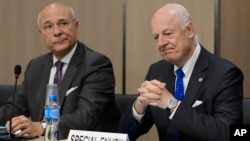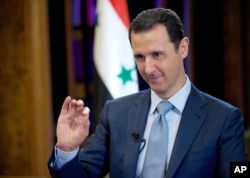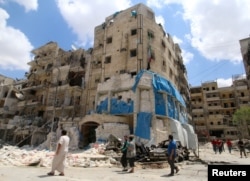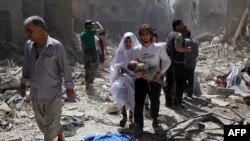Talks on ending the five-year Syrian conflict have ground to a halt in Geneva, and the United Nations mediator on Thursday appealed to the United States and Russia to help put the peace process on track as violence worsened in Syria.
“There is no reason that both of them, who have been putting so much political capital in that success story and have a common interest in not seeing Syria ending up on another cycle of war, should not be able to revitalize what they created, and which is still alive, but barely,” Staffan de Mistura, the U.N. mediator, said early Thursday.
The latest round lasted two weeks and failed to produce a face-to-face meeting between the government and opposition delegations.
Seeking compromise
The main divide is on the question of whether Syrian President Bashar al- Assad should remain in power. In a desperate effort to salvage what was the third round of proximity talks since January, mediators floated alternatives, including the formation of a transitional government run by a council made up of military officials and moderate rebels.
None of the options was accepted by either side.
Last week, most of the opposition walked out of the talks in protest of what rebels said were the government’s continued attacks that were making the delivery of humanitarian shipments impossible, in violation of a cease-fire brokered by the U.S. and Russia in February.
“How can you have substantial talks when you have only news about bombing and shelling?” de Mistura said Thursday.
Renewed violence
Hours after he spoke, violence flared yet again. Doctors Without Borders said at least 14 people were killed in airstrikes at a hospital run by the group in the city of Aleppo. Syrian state media said a total of 27 people died in violence that included shelling by rebel forces.
It was the latest incident in what has been a week of reported airstrikes, rocket attacks, and gunfire in the city.
Cease-fire in jeopardy
“The cease-fire agreement was an American-Russian deal. For it to continue, we need them to remain very determined to keep it going,” Rim Turkmani, a researcher at the London School of Economics’ Civil Society & Human Security Research Unit and a senior adviser to de Mistura, told VOA after returning from Geneva.
“Both of them need to keep working together, make sure they don’t do something the other doesn’t want. It’s not time to fight each other. They both need to rally behind one solution in Syria,” she said.
Moscow and Washington are divided on whether Assad should remain in power. Russia supports the Assad government and wants Assad to stay. The United States wants him to leave.
High-level talks between U.S. and Russian officials have been under way for the past week. One of the aims of the discussions is to set a date for a meeting of the International Syria Support Group to bolster the peace process.
IN PICTURES: Deadly airstrikes in Aleppo







